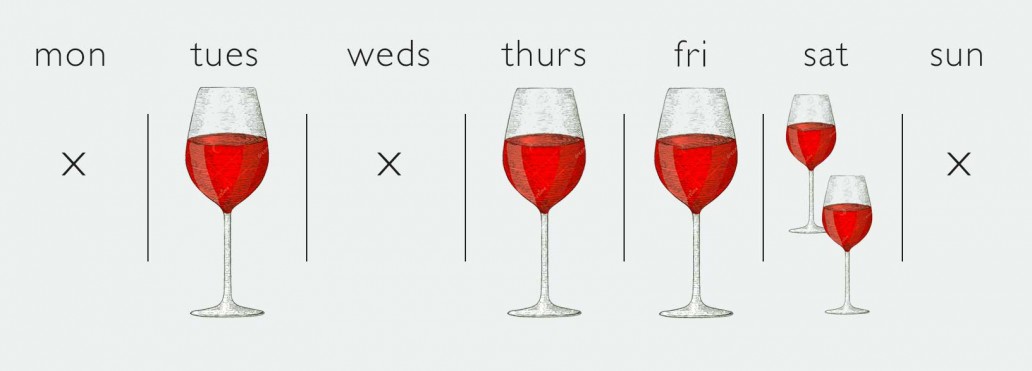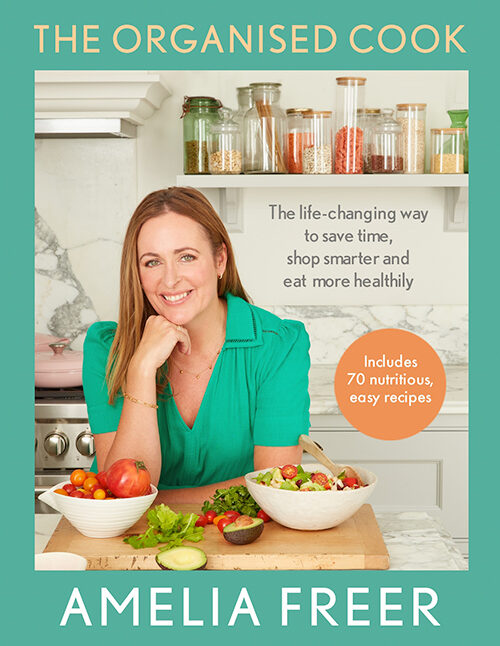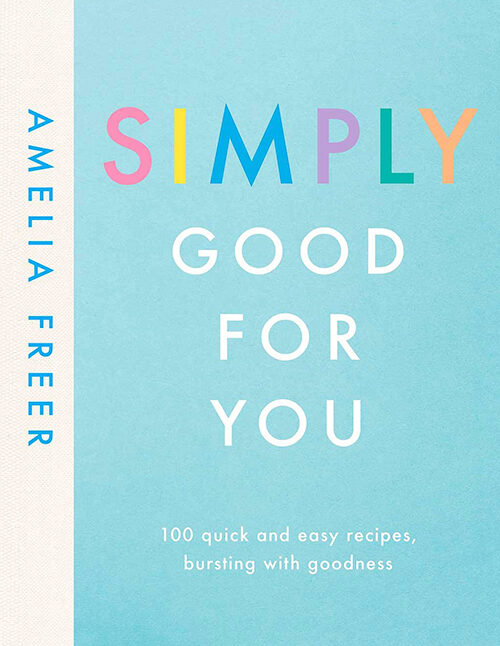Alcohol: How much is too much?
Oct 2019
I, like many, really do love a glass or two, especially at times of celebration, but I’m so often asked for guidance about how much is too much?
There is a general consensus that a little wine each evening is good for us, although most of us also know that swigging a bottle (easily done!) on a regular basis is too much.
But what is the actual evidence for this? And is it really correct?
As always, I am a huge believer in spreading the message of balanced science – presenting you with the evidence directly, so that you can make your own informed choices. I know that sometimes this can in itself be frustrating, as we are often unconsciously seeking a set of simple ‘rules’ to live by. But I am afraid that there are very rarely any hard and fast rules when it comes to nutrition or lifestyle medicine. It is simply a case of weighing up the pros and cons of each individual circumstance, then deciding for yourself what is appropriate and right for you.
But, there may be a problem with the statistics in these studies…
The people who drank no alcohol in these studies may have been more likely to be otherwise unwell. So, it could be the fact that they are already unwell which means that they don’t drink (and are therefore more likely to have increased mortality), rather than the fact that they don’t drink increasing mortality rates directly (Stockwell et al., 2016). It’s a subtle, but very important difference, which throws a big question mark over the idea that drinking moderately is better for us than not drinking at all.Alcohol consumption has been linked to a huge number of problems. It is, after all, a psycho-active substance that can sadly lead to significant problems with addiction and dependency. It has also been linked to over 200 different disease and injury conditions, including:
Cancers of the mouth and throat, colon, breast, liver and rectum.
High blood pressure
Liver disease (such as cirrhosis)
Chronic pancreatitis
Accidental injury
Stroke
(WHO, 2014) (Corrao et al., 2004)This may all be a little bit too reductionist. The context in which you choose to drink may be just as important as the amount you are drinking (within reason!). For example, wine is considered an important part of the Mediterranean Diet which has itself been associated with all sorts of health benefits.In a study of over 18,000 Spanish participants, it was found that the closer people drank to a traditional, moderate, Mediterranean pattern of mainly red wine consumption, the greater the association with reduced mortality (Gea et al., 2014). In other words, if you do choose to drink, the best way to do so is probably copy the culture of Mediterranean countries:
Drink moderately with meals, mainly red wine, spread out evenly over the week and very rarely in excess.
Perhaps that small sunset glass of wine on the terrace with supper is ok!Finally, the type of alcohol you choose is also important. Red wine in particular may have more beneficial than, for example, beer or spirits, effects (Grønbæk et al., 2000) (Arranz et al., 2012) (Chiva-Blanch et al., 2012). This may be because of its polyphenol content (dietary antioxidants), but this too is contentious, as some researchers argue that you would have to drink buckets of the stuff to get any meaningful antioxidant effects which is definitely NOT recommended! (Fernandes et al., 2017).
What’s my advice as a nutritional therapist?
If you don’t drink already, there is no good evidence to suggest that starting to drink will offer you any health benefits.
If you do drink, then it is important that you try your best to stick within the limits recommended by the government advisory boards, which is now 14 units per week for both men and women.
But if you want my personal opinion, I almost always recommend drinking less than this. My recommendation would therefore be to aim for <10 units per week, with at least 2 alcohol-free days. I think this is a sensible compromise between complete abstinence (which may be the ‘healthiest’ option) and drinking very merrily we shouldn’t forget can come some social benefits). There are, however, number of diseases conditions where form alcohol certainly safest option. If in doubt, seek advice doctor or nutrition professional to help guide you. you are pregnant, trying conceive, it important that avoid altogether. no safe limit for pregnancy, developing embryo particularly vulnerable effects first few weeks – often before even know pregnant. Seedlip produce a lovely alcohol-free spirit, which means that you can still enjoy a ‘grown-up’ tasting drink whilst completely avoiding alcohol (and no, I am not paid to advertise for them, I genuinely like it!)
What might this look like over the course of a week?
Assuming you are drinking wine of around 12% alcohol content, this may be the sort of pattern I would recommend to my generally healthy clients who want to continue drinking over the course of a week. Do note that the glass size is 125ml, so it is pretty small, but as I always point out, it is usually the first couple of sips that are the best anyway.

Another top I often share is to invest in a couple of incredibly beautiful and pleasurable-to-use small wine glasses. Antique ones are often smaller than modern ones anyway. Psychologically, we feel better about moderating our alcohol intake if we feel like we have had a whole glass – not just half a bigger glass.
The other benefit is that you are able to use the money you’ve saved on drinking less, to buy better quality (ideally organic) wine. Wine to savour and enjoy rather than glug down. Do get yourself a proper wine stopper though, so that a single bottle will keep for at least a week without going off. That way, you don’t have the pressure to ‘just finish it off’ to avoid wasting any.
Finally, if you are used to coming home from work and pouring a glass straight from the fridge, have some ice cold filtered water or fizzy water ready to go instead. Rehydrate yourself first, give it 10 minutes, and only then enjoy your glass of wine, perhaps with a few nuts or some kinds of protein to help balance the sugar effects.
Useful resources
For more information on alcohol & units: drinkaware.co.ukpatient.info/health/alcohol-and-sensible-drinking
Alcohol and You: A handy self-help guide: ntw.nhs.uk/
References & Bibliography
Arranz, S., Chiva-Blanch, G., Valderas-Martínez, P., Medina-Remón, A., Lamuela-Raventós, R. and Estruch, R. (2012). Wine, Beer, Alcohol and Polyphenols on Cardiovascular Disease and Cancer. Nutrients, 4(12), pp.759-781.
Chiva-Blanch, G., Arranz, S., Lamuela-Raventos, R. and Estruch, R. (2013). Effects of Wine, Alcohol and Polyphenols on Cardiovascular Disease Risk Factors: Evidences from Human Studies. Alcohol and Alcoholism, 48(3), pp.270-277.
Corrao, G., Bagnardi, V., Zambon, A. and La Vecchia, C. (2004). A meta-analysis of alcohol consumption and the risk of 15 diseases. Preventive Medicine, 38(5), pp.613-619.
Fernandes, I., Pérez-Gregorio, R., Soares, S., Mateus, N. and de Freitas, V. (2017). Wine Flavonoids in Health and Disease Prevention. Molecules, 22(4), p.292.
Gea, A., Bes-Rastrollo, M., Toledo, E., Garcia-Lopez, M., Beunza, J., Estruch, R. and Martinez-Gonzalez, M. (2014). Mediterranean alcohol-drinking pattern and mortality in the SUN (Seguimiento Universidad de Navarra) Project: a prospective cohort study. British Journal of Nutrition, 111(10), pp.1871-1880.
Grønbæk, M., Becker, U., Johansen, D., Gottscahau, A., Schnohr, P., Hein, H. and et al. (2000). Type of Alcohol Consumed and Mortality from All Causes, Coronary Heart Disease, and Cancer. Annals of Internal Medicine, 133(6), p.411.
Stockwell, T., Zhao, J., Panwar, S., Roemer, A., Naimi, T. and Chikritzhs, T. (2016). Do “Moderate” Drinkers Have Reduced Mortality Risk? A Systematic Review and Meta-Analysis of Alcohol Consumption and All-Cause Mortality. Journal of Studies on Alcohol and Drugs, 77(2), pp.185-198.
WHO: World Health Organisation (2014). Global status report on alcohol and health, 2014. 1st ed. Geneva: World Health Organization.
MORE TO EXPLORE
Please note that the information on this website is provided for general information only, it should not be treated as a substitute for the medical advice of your own doctor or any other health care professional providing personalised nutrition or lifestyle advice. If you have any concerns about your general health, you should contact your local health care provider.
This website uses some carefully selected affiliate links. If you buy through these links, we may earn an affiliate commission, at no additional cost to you. This helps to keep all of our online content free for everyone to access. Thank you.




